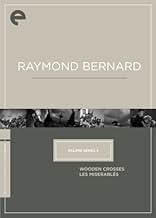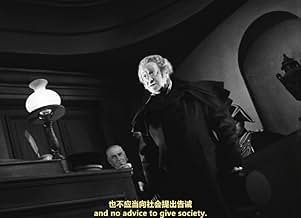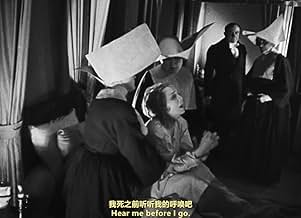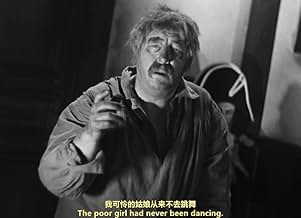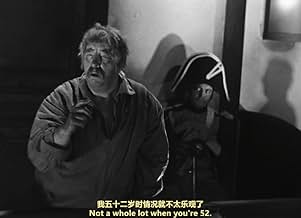Die Verdammten (1 Teil: Ewige Fesseln/2 Teil: Heimatlos)
Füge eine Handlung in deiner Sprache hinzuThe lives of numerous people over the course of 20 years in 19th century France, weaved together by the story of an ex-convict named Jean Valjean on the run from an obsessive police inspecto... Alles lesenThe lives of numerous people over the course of 20 years in 19th century France, weaved together by the story of an ex-convict named Jean Valjean on the run from an obsessive police inspector, who pursues him for only a minor offense.The lives of numerous people over the course of 20 years in 19th century France, weaved together by the story of an ex-convict named Jean Valjean on the run from an obsessive police inspector, who pursues him for only a minor offense.
- Regie
- Drehbuch
- Hauptbesetzung
- Auszeichnungen
- 1 wins total
- Félix Tholomiez
- (Nicht genannt)
Empfohlene Bewertungen
People interested in his Hugo adaptation (and they are numerous) should try and watch other works : a prolific director,he made forgettable movies (like everybody else) but "Cavalcade d'Amour " (1939) which tells three love stories in the same place but at different times;"Un Ami Viendra Ce Soir" a curious movie about the French Resistance - which might have inspired De Broca for his highly praised "Le Roi De Coeur ";"Le Jugement De Dieu" , a brilliant melodrama in the Middle Ages poorly remade later as a sketch of "Les Amours Célèbres with B. Bardot and A.Delon;a black comedy " Le Septième Ciel" ,all these movies worth seeking out;there's also a silent version of "Le Miracle Des Loups "(1924),later remade by André Hunebelle in the sixties.
Forgive me for this long introduction,but it's really a pity this director should be ignored even in his native country (among the many comments,how many come from French users?).
In the thirties ,it was a titanic task,actually an equivalent of Gance's "Napoleon" of the twenties;it's the only French thirties work which features three parts :at the time,in Paris, it was possible to see the whole in one day,for the theaters did not show the same film;later on,with the staggering exception of "Les Enfants Du Paris" ,the two-part movies (such as "Le Comte De Monte Cristo" and Le Chanois's much inferior own "Miserables" ) were released several months apart.
The male cast is close to perfect:Harry Baur is considered one of best French actors of all time ,the extraordinary lead of Duvivier's first talkie "David Golder "and was made to portray Valjean ;his restrained but highly intense acting works wonders in the scene with bishop Myriel and in all his scenes with Javert played by the always reliable Charles Vanel ,the only French actor enjoying 2 movies in the IMDb top 250- 'Le Salaire De La Peur " and "Les Diaboliques" - by the way!matching them all along the way is Charles Dullin - a great stage actor whose portraying of Molière's Harpagon has remained memorable-as Thénardier ,with his face ravaged by greed;Jean Servais the French audience mainly remembers for his later parts and often forgets there was a time when he was young,and he is a very good Marius.
On the other hand,the female parts are more uneven ;Florelle as Fantine is deeply moving ,the destitution's child who endures the unwed mother's fate;the great Marguerite Moreno shines as La Thénardier ,the actress was as convincing as a shrew as she was as a Grande dame;Pagnol's Orane Demazis is less talented as Eponine although she fortunately forgets her Provençal accent and has a good final scene (the part was intended for Arletty ) ;as for the forgotten actress who plays Cosette,she is totally bland (the part was intended for Danielle Darrieux)
Although Waterloo is not included -represented here by a painting and some Thénardier's lines- there are imposing scenes on the barricades ,and the death of Gavroche ("this little soul had flown away") is really moving,with a young actor with more screen presence than his sister;more intimate scenes such as these with bishop Myriel go straight to the heart ;and "the tempest in the skull" shows Bernard's virtuosity ,here in a league with Abel Gance .
Neither Le Chanois's nor Hossein's versions ,let alone American effort starring Liam Neeson can hold a candle to Bernard's Magnum Opus.
4½ hours long, subtitled black-and-white Victor Hugo epic doesn't sound appealing, or only to 'art house' fans, but not so ... if you ever get a chance to see it, do!
The acting is tremendous, as is the cinematography. Certain visual moments are forever imprinted on my mind, such as the moment when a helping hand comes out of nowhere to help the collapsed Cosette, or the moment when a nun, sworn to always tell the truth, lies to protect the protagonist, Jean Valjean.
It is a superb retelling, and remains the best version of this classic novel. What makes it even more poignant is how themes in the movie were reflected in the real lives of the actors. Harry Baur, who plays the lead - a man falsely imprisoned and whom is relentless pursued through the film - lost his life a few years later at the hand of the Gestapo for being suspected of aiding the resistance, and Gaby Triquet (the young Cosette) was shamed and blacklisted for having an affair with a German soldier and never worked again.
I've seen a few 1930s features, and while enjoying them, would not expect others to sit through them. Not this! It is everything a good movie is about - superbly crafted, mesmerising to watch, and leaves you seeing the world slightly differently afterwards. I've never seen better.
Wusstest du schon
- WissenswertesRe-released in France in 1951.
- PatzerIn the second part, Les Thenardier, when Jean Servais overhears the pair plotting to rob Valjean, Raymond Bernard can be heard softly directing him to leave the room ("Vite!").
- Zitate
Cosette: [as she and Valjean witness a convoy of convicts being taken to the penal colonies] But father... are they... still human?
Jean Valjean: Sometimes.
- VerbindungenFeatured in Les Misérables (1995)
Top-Auswahl
Details
- Erscheinungsdatum
- Herkunftsland
- Offizieller Standort
- Sprache
- Auch bekannt als
- Die Verdammten
- Drehorte
- Antibes, Alpes-Maritimes, Frankreich(Exterior)
- Produktionsfirma
- Weitere beteiligte Unternehmen bei IMDbPro anzeigen
- Laufzeit
- 4 Std. 39 Min.(279 min)
- Farbe
- Seitenverhältnis
- 1.37 : 1

